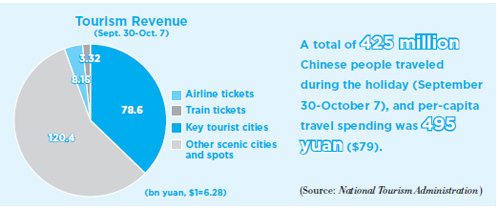|
The key to boosting spending lies in more holidays and stricter implementation of the paid leave policy, according to analysts.
Chinese who have worked for one to 10 years are entitled to one paid five-day vacation. Those who have worked for 10 to 20 years are given 10 days of paid vacation. This minimal amount of vacation means Chinese are often propelled to make full use of their time off.
In 2008, the seven-day Labor Day holiday was replaced with four shorter breaks, leaving Chinese workers with only two seven-day holidays each year, the National Day holiday and the Spring Festival.
As the Spring Festival is traditionally a time for family reunions, the National Day holiday is used for trips longer than two or three days.
Despite the Regulations for Paid Annual Leave for Employees policy, which came into effect in 2008, 54.5 of respondents in one survey said they never took their annual leave, according to Xinhua.
The key to increasing domestic consumption is to give consumers more time off and ensure they take their paid holidays, said Zhao Ping, Deputy Director of the Department of Consumption Economy Studies at CAITEC.
The paid leave system is still at a preliminary stage in China, said Luo Biao, Deputy Director of the EMBA Center at the University of Science and Technology of China. "In developed countries like the United States or in European countries, the tourism sector is very advanced. In order to further develop China's tourism sector, a flexible vacation system is badly needed. Economic development has given Chinese more money, but not so much time to spend it," he said.
The potential for tourism is huge, said Zhang Guangrui, Director of the Tourism Research Center of the Chinese Academy of Social Sciences. "However, too much emphasis on tourism could have a negative impact on travelers, such as road gridlock and overcrowding," he said.
On October 2, 186,000 people visited the Forbidden City in the heart of Beijing, setting a record for the largest number of single-day visitors ever. "I saw nothing but people's heads in the Forbidden City," said a tourist surnamed Guo.
While the holiday spending spree has brought to light the potential for consumers to blow their cash, some argue more needs to be done to ensure sustainable long-term consumption.
"To spur the economy, we should first spur domestic consumption. To spur domestic consumption, we should continue fiscal and tax reforms to improve people's livelihood, especially for those of low-income," said Liu Yuanchun, deputy head of the School of Economics at Renmin University of China. "In the long run, income distribution reform should be initiated as soon as possible."
In order to fully tap the potential of consumption to shore up the economy, more long-term policies, such as improving the consumption environment, scrapping unreasonable charges related to commodities and lowering tariffs for imported goods are needed, said Zhang of the China Center for International Economic Exchanges.
"In the long run, the country needs to optimize income allocation in order to increase people's incomes," he said.
More money in your pocket often leads to more consumption and more consumption leads to a happy life, at least for some, like the newly wedded Lin.
"After holding a 300,000-yuan wedding during the Golden Week, my wife and I have a better relationship and we feel happier," said Lin. "It was totally worthwhile."

| 